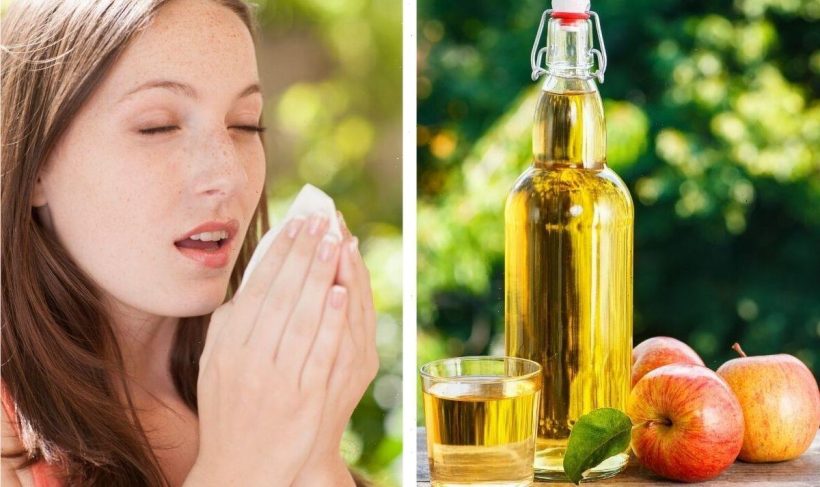Apple cider vinegar: Surprising ways to use health product
We use your sign-up to provide content in ways you’ve consented to and to improve our understanding of you. This may include adverts from us and 3rd parties based on our understanding. You can unsubscribe at any time. More info
Hayfever season is upon us, leaving between 10 and 30 percent of all UK adults looking for ways to manage unpleasant symptoms on a daily basis. While antihistamines are the most obvious remedy for seasonal allergies, side effects such as drowsiness can make them an unfavourable choice. Local honey and stinging nettles are just two well-known remedies for allergies, but how does apple cider vinegar compare? Is it really effective at relieving common hayfever symptoms?
Is apple cider vinegar good for hayfever?
Apple cider vinegar (ACV) is a popular alternative treatment for a number of conditions, including seasonal allergies and hayfever.
Growing online pharmacy, Atropa Pharmacy, said: “Raw apple cider vinegar is really helpful in the battle against hay fever symptoms.
“It helps alleviate inflammation and congestion, is highly nutritious, has antihistamine properties and supports a healthy immune system.”
While this acidic liquid has not yet been proven to ‘cure’ all hayfever symptoms in an instant, it has been shown to improve the immune system, which plays a key role in managing the physical effects of allergies.


ACV for a healthier immune system
Despite a lack of concrete evidence to prove the link between ACV and hayfever, a number of studies have shown that this remedy can work in some cases.
According to a 2017 study, ACV and probiotics were found to boost the number of protective enzymes and antibodies when added to the diet of carp.
The study found that there was a visible increase in the levels of these protective cells in the mucus of the fish – which is where the link to hayfever comes in.
Taking apple cider vinegar on a daily basis could help curb allergies, but only if the results found in the fish are the same in humans.

Apple cider vinegar for inflammation
Reducing inflammation in the body could help make allergy attacks more manageable by making common symptoms less intense.
Inflammation in the lining of the nose and swollen, itchy eyes are just two common effects of hayfever which could be eased with ACV.
A 2001 study found that apple cider vinegar was able to lower the blood pressure in an experiment done on rats, though this is yet to be proven on humans.
Antiglycemic effects have also been linked to ACV ingestion, with two studies in 1998 and 2005 having proven a clear effect of this acidic liquid on reducing inflammation in the body.
DON’T MISS:
Hayfever season: Affected by grass pollen? When to take medication [REVEAL]
The 5 flowers to avoid in your garden if you develop hayfever [INSIGHT]
Arthritis: Think twice before taking apple cider vinegar for symptoms [ANALYSIS]

How to take apple cider vinegar for hayfever
While there is no single study which supports a clear link between using apple cider vinegar for hayfever, this holistic alternative to antihistamines is worth a try if you’re unable to take them.
Atropa Pharmacy recommended drinking a diluted apple cider vinegar drink three to four times a day during hayfever season.
The pharmacy said: “Try drinking a tablespoon of raw cider vinegar in warm water with the juice of half a lemon and a teaspoonful of raw local honey.”
For a colder ACV beverage, the Cheltenham Holistic Health Centre recommended adding two teaspoons of apple cider vinegar to a glass of water and drinking it three times a day, for four days.
The health centre claimed that this simple trick will make allergies “disappear for the season”.
What are the best natural remedies for hayfever?
The beauty of the cider vinegar and honey cure is that there are little to no side effects, unlike those associated with antihistamines and other hayfever drugs.
While a daily dose of ACV is certainly worth a try, there are a number of other holistic remedies which have been shown to reduce seasonal allergy symptoms.
Watery eyes, a sore throat and an itchy or runny nose can all be helped by:
- Drinking camomile tea
- Taking boswellia tablets
- Eating organic local honey
- Consuming local herbs such as echinacea, yarrow and elderflower
- Adding more probiotics to your diet
- Eating more quercetin – found in citrus, apples, onions, parsley, sage, broccoli and berries
Source: Read Full Article






